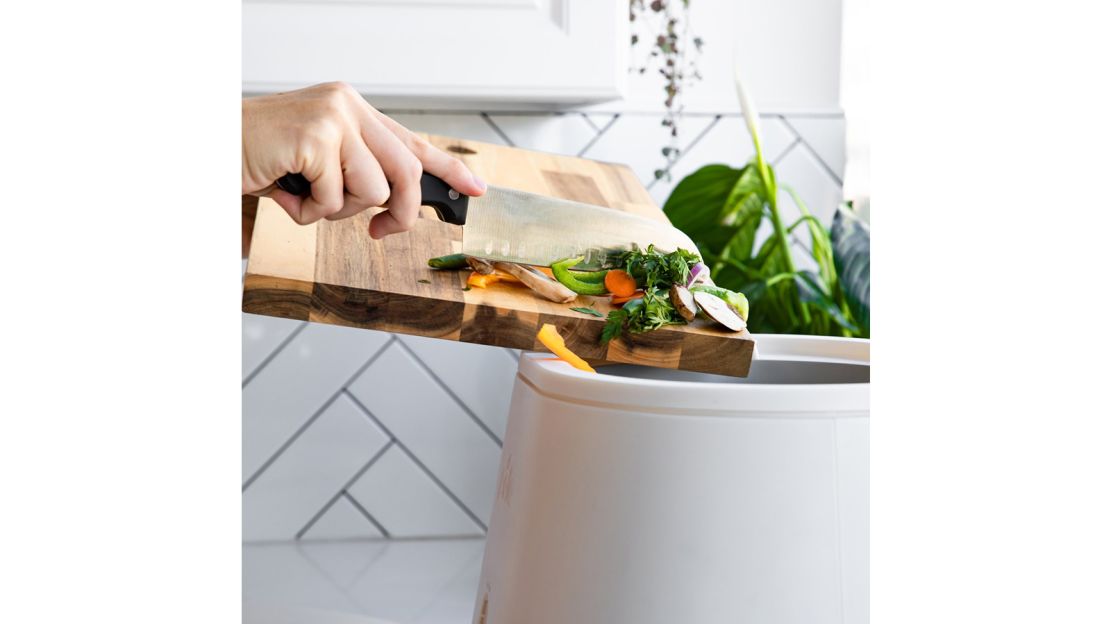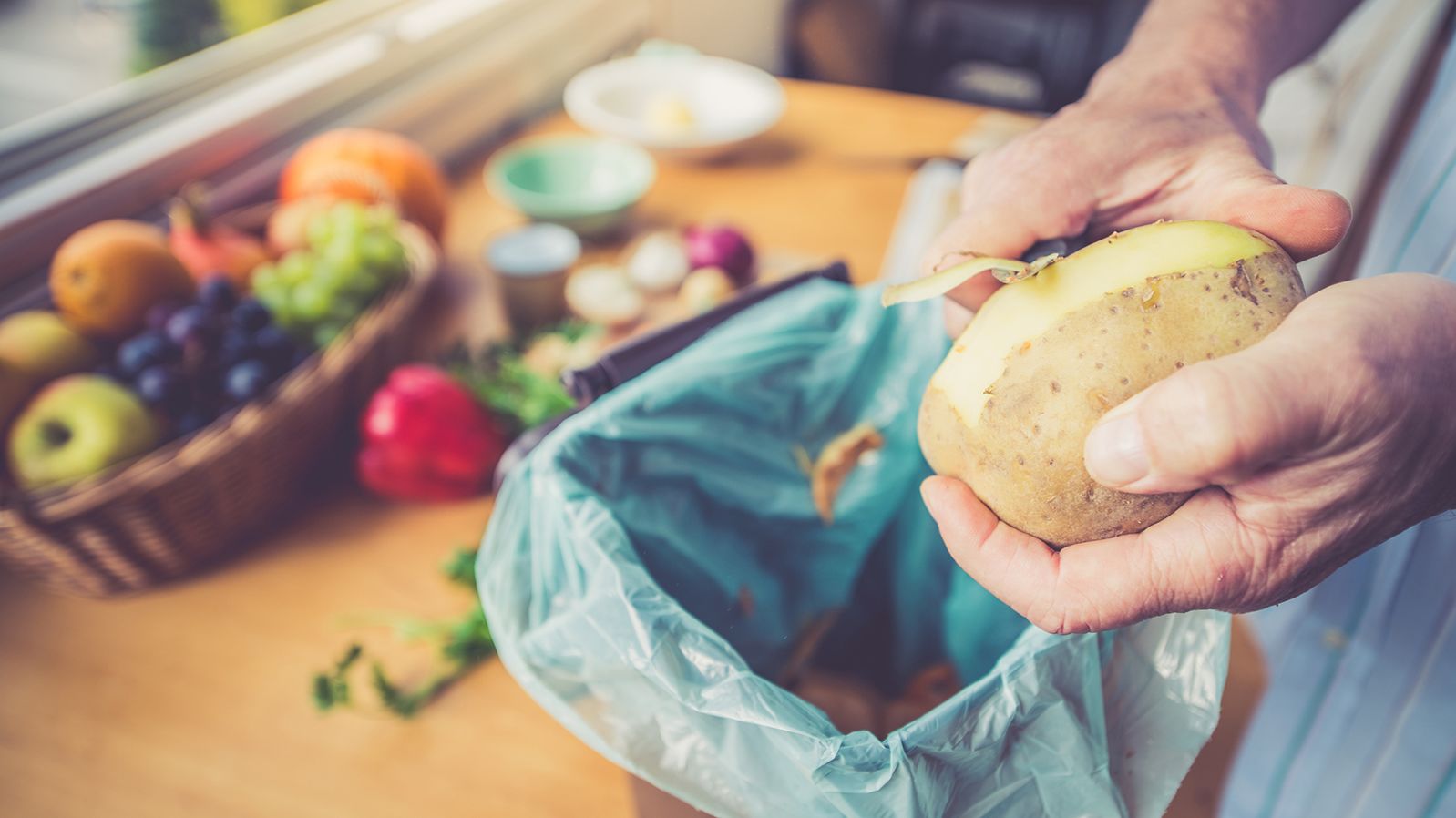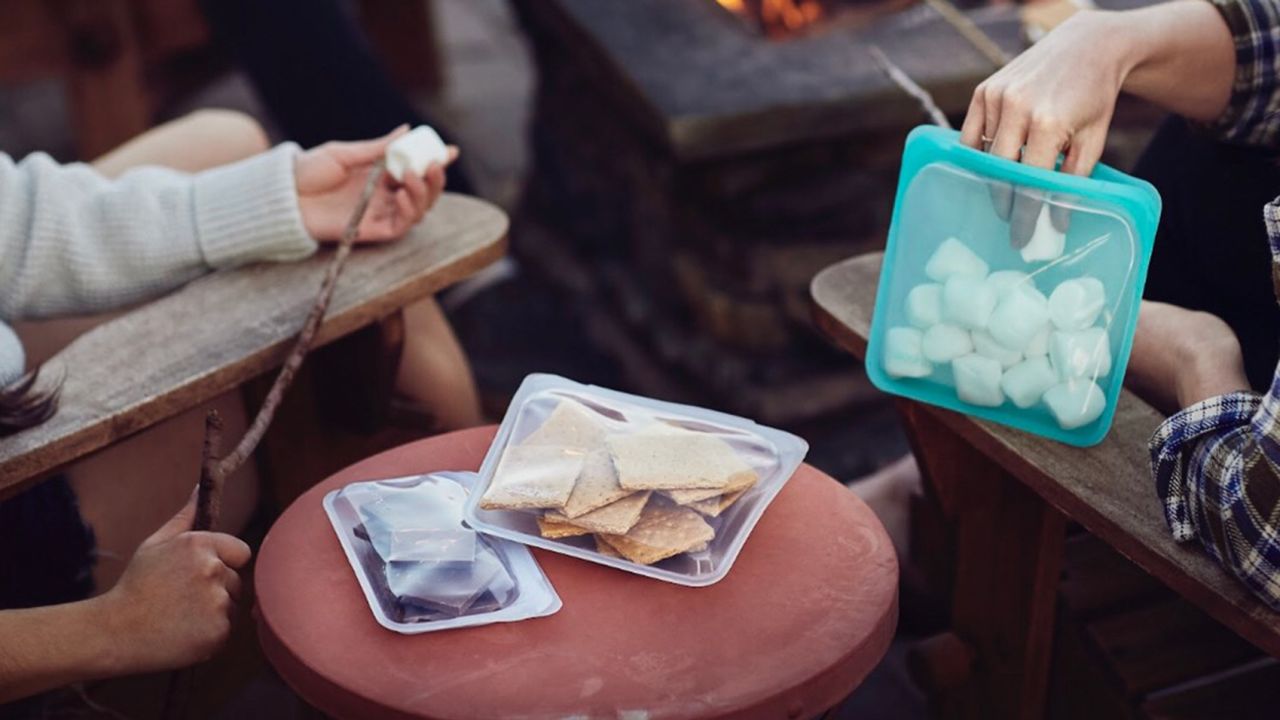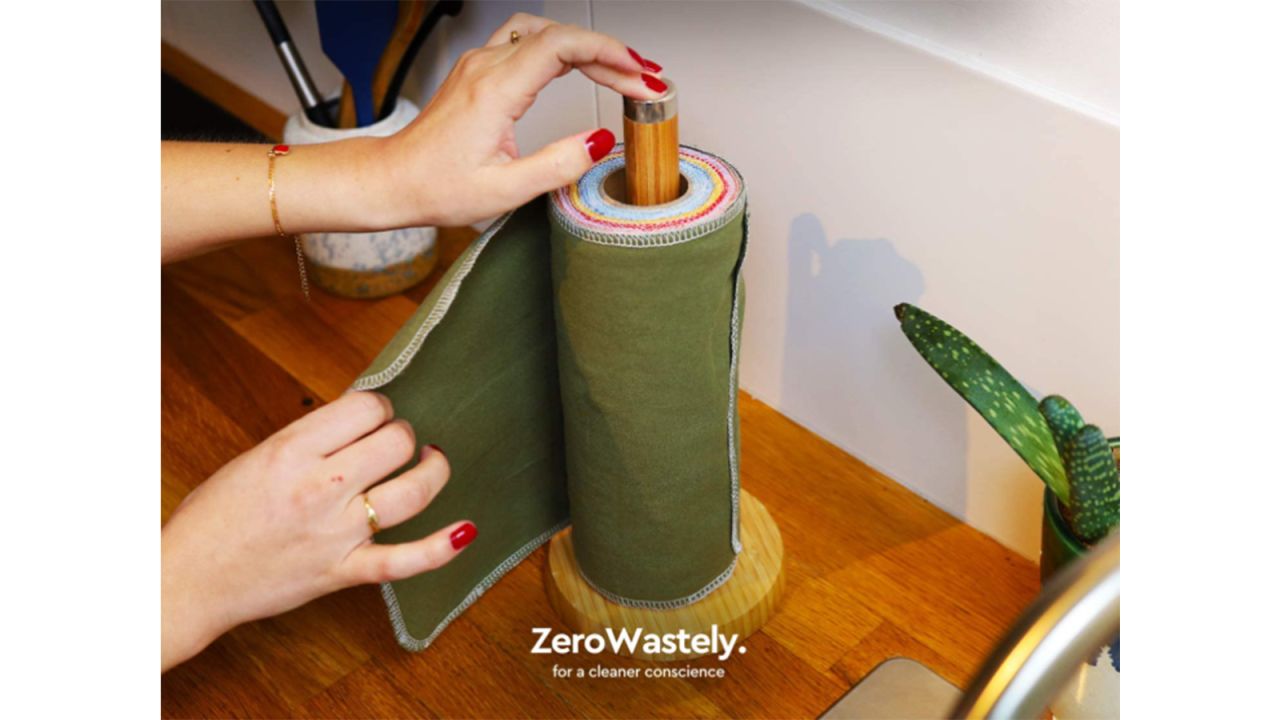Millions of Americans have been joining the movement to buy greener and more sustainable products that are better for the health of the planet. But navigating the number of growing options and figuring out where and which products to swap is easier said than done.
One of the best rooms you can start in is the kitchen. And while ditching single-use items like paper towels and plastic bags in your space is great, according to the EPA, focusing on reducing your food waste is even more impactful. In addition to saving you money and lowering your carbon footprint, odds are you probably already have some items in your home that can help you cut back on food waste. All it takes is a little effort and perhaps a little education.
To get your journey to “greener” pastures started, we consulted with seasoned experts in creating a more sustainable lifestyle to get their input on the simple swaps that can help you make a big change in your home.
How to start being sustainable
Before you jump straight in and go swap-crazy, you’ll first want to understand what waste is actually being produced in your household. Food waste, like vegetable ends and fruit rinds, tends to be universal to every home and can be solved by setting up a compost bin. To determine how to take care of other household waste, Candice Batista from The Eco Hub recommends doing a week-long trash audit.

“You’re just going to compile everything that you buy and instead of throwing it out, you’re going to keep it; you’re going to have one pile for your garbage, one pile for your recycling,” says Batista, who also explains that you can keep your compostable scraps separate from this audit. “Then you’re going to look at those two piles and say, ‘Okay, am I throwing away a lot of stuff where I could be more sustainable?’”
From here, you can better consider which swaps will work for your lifestyle: If you’re buying your eggs in styrofoam, can you get them in cardboard instead? If you have a lot of plastic jars or bottles, can you find them in more-recyclable glass options? Are there any items you can refill at a nearby bulk store or supermarket?
You’ve probably heard of the 3 Rs before: reduce, reuse and recycle, which is a great mantra to follow if you’re looking to make your lifestyle more sustainable. You can start by reducing the amount of things that contribute towards waste. Think about all the plastic grocery bags you wouldn’t have to hassle with if you switch to reusable bags or all the food waste you could resurrect by meal planning and saving leftovers.

Try not to feel too overwhelmed though. Batista explains that consumer society is not set up to help us live sustainably, which is why it can seem daunting to start. Luckily, brands are catching on that people want more green options to shop from. Start small, going room by room or drawer by drawer, figuring out which swaps make the most sense for you.
“It’s really about starting one thing and developing those habits and seeing kind of how it works for your lifestyle, and then moving on to the bigger stuff,” explains Batista. “It’s really not about doing everything all at once.”
Ahead, we’ve rounded up 20 sustainable swap ideas for you to consider for your home kitchen.
Compost bins
“The number one best way to reduce waste in your kitchen is to start composting,” says Kathryn Kellogg, founder of Going Zero Waste. In addition to reducing the smell from your trash, making compost also helps keep food waste, which is the single largest component taking up space in US landfills according to the EPA,?from taking up more space and releasing harmful methane gas. While the first step in reducing food waste is buying less food and eating what you have, composting your leftover scraps that you can’t eat anyway helps too.
Kellogg recommends checking to see what compost programs are local to your area, since some cities like New York City offer curbside composting programs while other areas may require you to drop off your compost at a designated site. This Epica stainless steel bin is great if you're looking to get started composting your food scraps. And if you need help figuring out how to compost in the first place, we’ve got a guide on that too.
If you don’t want to deal with the stench of food scraps, this Lomi Composter has high-tech features that can turn your food waste into dirt in mere hours right from your countertop. It’s definitely on the higher end of countertop composters on the market, however, you can use the dirt it creates for your backyard garden or household plants.?
Food storage
It’s estimated that globally one third of all food produced goes to waste. So you might have guessed that one way to be more sustainable is to cut back on food waste in your own home. Reusable containers like these from Rubbermaid not only cut back on the use of plastic bags and wrappers, but also allow you to easily store leftovers in your fridge, freezer or lunch box.
Batista recommends looking up the model of your home fridge and learning how you can maximize organization to prevent waste. “That's really important,” says Batista. “Because when you store foods in the wrong place in the fridge, they do go off quicker.”
Beeswax wrappers are another tool to help save your food without reaching for single-use plastic. And while they might be more expensive up front, we found they’re reusable for much longer than their plastic counterparts and actually might save you a few dollars in the long run.
We’ve tested Stasher Bags for ourselves and found them to be a great option for on-the-go snacking, microwaving and freezing your favorite foods. Plus, they’re available in tons of sizes and colors to fit any job you might need.
If you love stocking up on fresh produce but hate all those grocery store plastic bags, try these reusable produce bags. Perfect for your weekend trips to the farmer’s market or any daily grocery store run, you can even repurpose them as laundry bags for your more delicate items.
Not only are reusable grocery bags sturdier than plastic ones, but you also won’t be left with a bundle of excess bags you seldom have use for. Plus, you probably already have a few spare bags around the house that you could use for grocery shopping. Stash a few in the trunk of your car or somewhere near your door, so you don’t forget them when the time comes to do your haul. If you don't already have bags on hand, these Gogooda bags are a great option since they can be folded down and stored in a purse, pocket or backpack for those last-minute errands. And they’re machine-washable, so they won’t be ruined by a busted or broken container.
Cookware
Kellogg’s kitchen is a plastic-wrap- and aluminum-foil-free space. “Aluminum foil is most often used for tenting, or in the oven to prevent things from getting burned or too brown on top,” says Kellogg. “That can be achieved just by putting another pan on top as well.” Or if you’re using foil because you just really detest scrubbing down your pans, try using one of these Mmat Silicone Baking Sheets, which are easy to wipe clean and, if you’re really not in a tidying mood, dishwasher-safe too. Read our review of them here.
Dishwasher-safe and oven-safe up to 450 degrees Fahrenheit, these Prepd sheets make single-pan meals a breeze and eliminate the need for aluminum foil or parchment. Plus, you can snag the matching lids to make cleanup and leftovers storage even easier.
Reusable towels
One of the simplest swaps you can make is switching out your single-use paper towels for a reusable option. “A paper product is something you buy knowing that you're going to throw it out,” says Batista “Imagine if you bought a sweater with the same mentality; I'm going to buy this sweater today, I'm going to wear it today, and four times and then I'm gonna throw it away.” These Swedish dishcloths are much beloved by our readers and reviewers alike.
If you’re worried about how reusable cloths will handle messier tasks, Batista recommends designating certain cloths for dirty jobs, like wiping away raw meat juices or doing deep cleaning. You can even use a permanent marker to label the cloths for different tasks throughout your home. These Swedish dishcloths from Wet-It come in a variety of colors and designs so you can find the ones that best fit your home aesthetic.
If you prefer the feel of a more cloth-like towel over the cellulose of a Swedish dishcloth, try these reusable towels from ZeroWastely. These towels naturally cling to each other and come with a reusable roll, so you can keep them on the same stand you already have for your paper towels.
Other kitchen swaps
Like many other kitchen items, traditional sponges aren’t easily recyclable. Instead, try these compostable scrubbers by Miw Piw as a replacement for all your plastic scrubs.
Batista loves this simple bamboo pot scraper tool for loosening food and grime stuck on cookware. “It makes it so easy to get rid of the food that's on that pan and you actually end up reducing the amount of water that you use,” says Batista.
If you love soda or sparkling water, Kellogg recommends you consider investing in a Soda Stream so you can enjoy your favorite beverages at home or on the go, but leave behind all the unnecessary cans and bottles.
Ditch the case of plastic water bottles and have a Brita for your home instead. And if you want water with you when you leave your house as well, consider investing in a sturdy water bottle to carry with you.?
For all the cooking you do in your kitchen, you also do a fair amount of cleaning it. This plant-based ingredient cleaning bundle from Blueland is good for any room in your house and includes a multi-purpose, bathroom and glass cleaner, plus a hand soap dispenser. Once you have the brand’s reusable Forever Bottles, just grab the concentrated tablet and mix with water when you need to restock. Read our full review of Blueland here.
Sub out your dishwashing liquid for this reusable Power Dish Spray from Dropps. One concentrated bottle yields six refillable rounds of washing and the spray bottle design makes it easier to soap up hard-to-reach areas. Read our review of Dropps here.
While everyone is entitled to their morning cup of joe, single-use coffee pods like K-Cups and Nespresso pods are hard to recycle and manage as waste, though the companies have made some effort to be more sustainable. If you don’t want to close up shop on your favorite appliance, opt for a reusable K-cup that you can fill with your favorite ground coffee and cut out plastics in your brewing routine.
If you prefer drip or pour-over coffee, try changing out your regular coffee filters for a compostable option. And when your brew is finished, you can chuck the filter with all its grounds right in the compost bin.








































